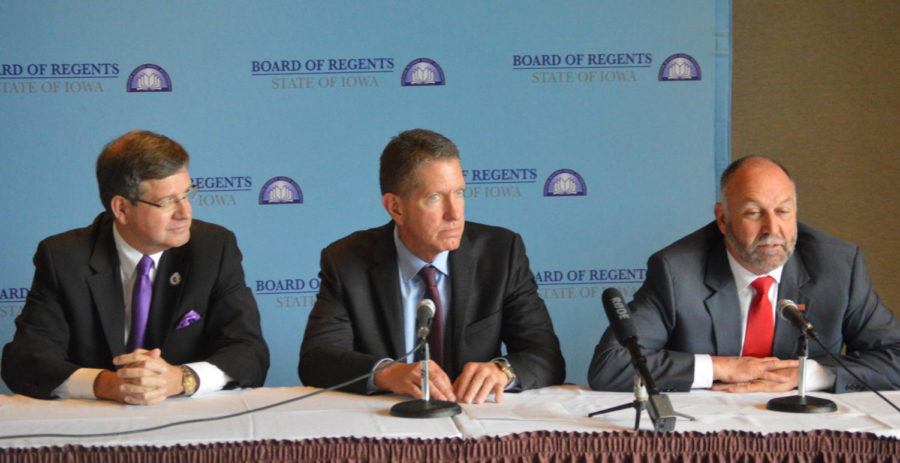Regents to meet on 2016-17 tuition rates, additional $500 international student fees
Matthew Rezab/Iowa State Daily
From left, UNI President Bill Ruud, Board of Regents President Bruce Rastetter and ISU President Steven Leath take questions from the media in the Scheman Building during the Board of Regents meeting on June 4.
October 19, 2015
The Iowa Board of Regents will meet Wednesday and Thursday in Iowa City. It will discuss 2016-2017 tuition increases — notably a proposed $500 per year increase in fees for three years for non-immigrant international students at Iowa State — as well as the request to create a new center at Iowa State and a graduate and professional student financial retention initiative.
The board is considering a 3 percent tuition increase for undergraduate resident students at the University of Iowa for the 2016-2017 school year. Undergraduate resident tuition were raised by 3 percent for Iowa State and University of Northern Iowa students for the spring semester and will not increase for the 2016-2017 school year under the proposed plan.
The board will also consider raising non-immigrant international student fees by $500 per year for the next three years at Iowa State, per Iowa State’s request.
“There are higher costs associated with providing services for international students,” said Jonathan Wickert, senior vice president and provost. “What’s been the case up to this point is that those costs have grown over the years, and it’s come to a point where we think it’s appropriate to have supplemental tuition for students who are really benefitting from those services.”
Wickert added that a number of other universities have implemented a supplemental tuition rate or fee for international students, including the University of Iowa, Ohio State University, the University of Wisconsin and Michigan State University — all of which exceeded the rates Iowa State is considering.
“Phasing it in like a staircase over a couple of years just makes the transition a little smoother and helps students with their planning,” Wickert said. “Nobody likes to increase tuition, but it’s really an issue of balancing the affordability with the quality of the education.”
Another item on the Board’s agenda is to consider Iowa State’s request to create a Center for Statistics and Application in Forensic Evidence. According to the Board of Regents’ docket, the purpose of the proposed center is to provide a national research center in forensic sciences, a center of excellence for research, outreach and education in statistical and probabilistic methods for the forensic sciences.
Iowa State is the lead institution and is partnered with Carnegie Mellon University, University of Virginia and the University of California at Irvine.
The National Institute for Standards and Technology has committed funds for the first five years of the center’s operation and requires that the center be established at Iowa State.
A third item scheduled for discussion is a graduate and professional student financial retention initiative organized by the professional student governments at the three Regent universities.
The initiative would include a 50 percent income tax break for Iowa-educated graduate and professional students who work in Iowa after graduation and a 75 percent income tax break for graduates who work in rural Iowa — outside the Iowa City and Cedar Rapids corridor and the Des Moines metropolitan area — after graduation. Each initiative would be offered for the first five years of employment after graduation.
The group of professional student governments at the Regent universities believes the tax breaks will allow graduate and professional students to pay for the education and reduce Iowa’s “Brain Drain” issue, where talented professionals leave Iowa, as well as stabilize the state’s population, especially among 20 to 30 year olds.
The only action taken will be the presentation of the tax break, and the group has also sent their proposal to Gov. Terry Branstad.

















